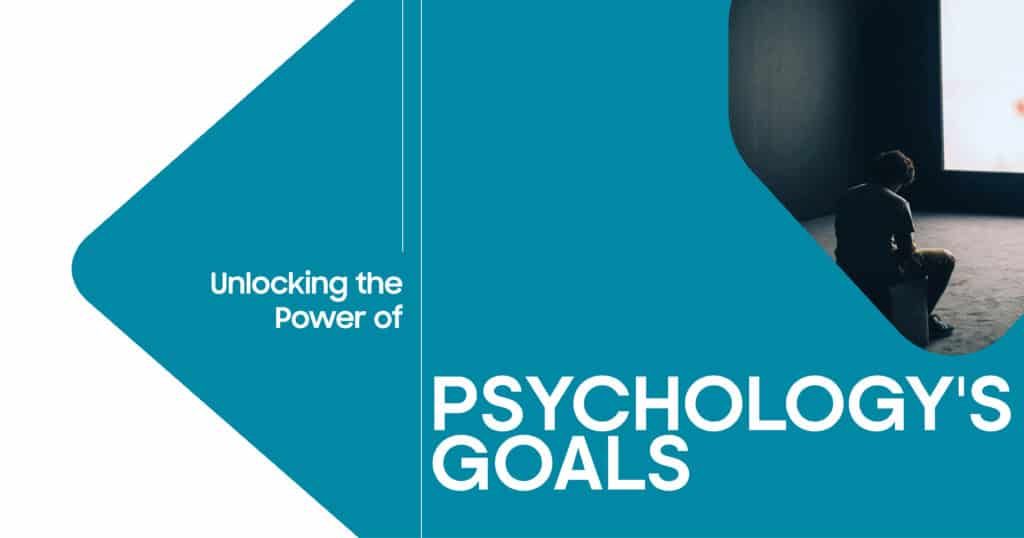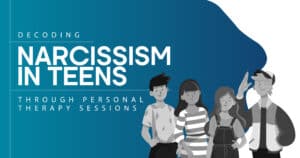Are you curious about the reasons you behave, think, or feel the way you do? Psychology’s core purpose is to answer these questions. As a discipline, psychology is concerned with systematically describing behavior, cognition, emotion, and perception, explaining the origins of your behaviors and thoughts, predicting your future behavior, and facilitating constructive change.
By achieving these four goals, psychology turns abstract mental processes, motivation development, and personality into identifiable and relatable patterns. This article aims to expand on the topic and help you better understand the four main goals of psychology so that you can deepen your understanding of yourself and others and create new avenues for growth.
Exploring the Four Goals of Psychology
Psychology uses four primary goals to understand ourselves and each other truly. These objectives: description, explanation, prediction, and change all work together to give a systematic approach to the study of human experience and create clear pathways to actionable change. Here’s a deeper look at each core goal of psychology:
Description
Description means objectively observing and recording behaviors, including thoughts and feelings. For example, you might measure how often you feel anxious in meetings or record specific negative thought patterns. Description aims to give a comprehensive account of “what is happening” without judgment. This is the important first step and anchors psychology to an observable reality.
Explanation
Explanation is meant to identify the “why” behind thoughts, feelings, and actions. It connects causes, for example, experience, biological reasons, or current stressors, to the patterned material you described.
If we take procrastination or feelings of defensiveness, for example, identifying the difference in motivation, this psychological goal will reveal the triggers or beliefs that might be fuelling the action.
Prediction
Prediction uses knowledge of causes to predict actions or mental states in the future. For example, if you know that busy, loud environments trigger your anxiety, psychology would predict that you are likely to feel anxious at a crowded event.
This outcome is useful in predicting potential obstacles, based on knowledge of patterns and explanations. Accurate prediction allows you to prepare, to manage possibilities for added difficulties, and also to determine when old habits may resurface.
Change
Change brings together psychological knowledge to form action plans to facilitate well-being, change unhelpful behaviors, or enhance functioning. This is the end goal: to convert understanding into action.
Techniques such as cognitive restructuring (changing ways of thinking) and exposure therapy (diffusing fear response) are examples.
California Mental Health
Behavior as the Foundation of Psychological Study
Your observable behavior, your actions, reactions, and habits are the most fundamental point in psychology. When psychologists study your behavior, they can see patterns that show what processes govern your brain, allowing them to better inspire change.
| Goal | Role of Behavior | Real-Life Example |
| Description | Documents what actions occur objectively. | You bite your nails during 80% of work meetings. |
| Explanation | Uncovers why behaviors happen (e.g., stress, learned habits). | Nail-biting reduces your anxiety in high-pressure situations. |
| Prediction | Anticipates when/where behaviors will recur based on triggers. | Upcoming deadlines will likely increase nail-biting. |
| Change | Develops interventions to replace unhelpful actions with adaptive ones. | Using a stress ball instead of biting nails during meetings. |
Your behavior makes the goals of psychology measurable. By noticing what you do, you are empowered to understand your triggers, face challenges head-on, and build healthier habits in your life, all of which are important to mental wellness.
Cognition and Its Role in Mental Processes
Cognition, your beliefs, thoughts, and perceptions, influence how you view the world. The nature of your mental processes strengthens decisions, emotions, and behaviors. Cognition is a primary unit of inquiry in psychology, which both illustrates how thought patterns influence one’s well-being and helps reframe unhelpful thoughts.
| Goal | Cognition’s Role | Real-Life Example |
| Description | Identifies what thoughts occur (e.g., self-talk patterns). | You think, ‘I’ll fail this task’ before starting work. |
| Explanation | Uncovers why thoughts arise (e.g., past failures, cognitive biases). | Perfectionism makes you assume tasks must be flawless. |
| Prediction | Anticipates how thoughts will affect future states (e.g., motivation, anxiety). | Self-critical thoughts will likely lower your confidence tomorrow. |
| Change | Applies strategies (e.g., cognitive restructuring) to replace distortions with balanced thinking. | Challenging ‘I’ll fail’ with ‘I can try step-by-step.’ |
If you can understand how your cognition works, you can have power over your mind, including being able to interrupt negative cycles before they arise.
Emotion’s Impact on Psychological Aims
Your feelings, whether joy, anger, fear, or sadness, are central to psychology’s four goals. They tell your mind about needs that you did not meet; they influence your decisions and flavor your experiences.
Learning about the connection between your needs and your emotions will help you understand how to use your emotions for growth instead of letting them control you.
- Description: Emotions help identify your internal state. For example, tracking when anxiety arises (e.g., before social events) describes your emotional landscape.
- Explanation: Psychology investigates why feelings arise. Anger may hide fear. Ongoing sadness may be linked to unreconciled loss or negative thinking patterns.
- Prediction: Recognizing your emotional patterns (e.g., irritability due to stress) allows you to anticipate your future response (i.e., “when I am feeling overwhelmed, I will likely get irritable with those I love”).
- Change: Techniques such as emotion regulation (e.g., deep breathing for panic) or process techniques (e.g., journaling) allow us to reshape faulty feelings into behavioral cues in a more constructive way.

Naming your feeling. “I am anxious, not angry”. This can help lessen the intensity of that emotion. In naming the emotion, you are creating self-awareness, and self-awareness is the first step in a process of psychological change.
California Mental Health
How Perception Shapes Psychological Research
Your perception, that is, the way you create meaning from sensory information, has a direct relationship with psychology’s aims. It also serves as a filter that converts pure data (i.e., sights and sounds) into personal meaning.
In considering research, psychology needs to account for this subjective perception to avoid making faulty conclusions.
- Description: Documents your thoughts about the situation (for example: viewing critique as an attack vs feedback).
- Explanation: Discusses the reasons why the perception differs (for example, past trauma can alter how we detect threat).
- Prediction: Predicts how you will react based on your perceptual biases (for example, if you perceive ambiguity as dangerous, you’re more likely to avoid uncertain tasks).
- Change: Revises distorted perceptions (for example: cognitive reappraisal: reframing “My boss hates me” to “My boss wants me to do better”).
Challenge your perception with “Is there evidence to support this interpretation? What are other ways to view this?” This practice builds cognitive flexibility.
Motivation: The Driver of Development
Motivation is the internal force that compels you to take action. It helps psychology accomplish its goals. It connects a moment of insight (description, explanation) to changes in reality, turning that moment of awareness into growth.
- Description: Keeps you aware of what energizes you (e.g., inner joy vs. external rewards).
- Explanation: Reveals why your motivation dips (e.g., burnout, misalignment of values).
- Prediction: Predicts whether you will stick with something or quit (e.g., low self-efficacy would predict quitting faster).
- Change: Increases your commitment using purpose-based techniques like taking one step at a time or working towards your core values.
Apply “if-then” planning as automatic behavior to tackle motivation drops. “If I feel too tired to cook my healthy meal, then I will eat a salad I prepped”.
Personality and Its Influence on Mental Health
Your personality consists of traits you display over time. This includes openness or neuroticism. They affect how you will perceive the goals of psychology.
- Description: Describes the traits you display in person (e.g., introverts avoiding crowds).
- Explanation: Indicates why the trait would impact one’s coping style (e.g., high neuroticism increases stress-related reactions).
- Prediction: Helps anticipate barriers (e.g., perfectionists being prone to burnout when under pressure).
- Change: Modifies the strategies to fit your unique situation (e.g., routine and organization for conscientious people; creative outlets for open people).
Think about your perceived “flaw” (e.g., “I’m too sensitive”) as a strength (e.g., “I notice subtle cues”). Don’t fight your personality traits, but instead, leverage them.
Discover Support With CA Mental Health
Understanding psychology’s goals, description, explanation, prediction, and change gives you valuable insights and potential, but knowing what to do with those insights often requires expert help.
At CA Mental Health, we specialize in turning those goals into your personal growth. We assist you in:
- Describe patterns in your behavior, thoughts, and emotions.
- Explain their roots with clarity.
- Predict challenges proactively.
- Change with evidence-based strategies designed for your unique situation.
Contact us today at CA Mental Health for evidence-based, compassionate care. Let’s begin your journey to resiliency.

California Mental Health
FAQs
How does behavior shape the primary goals of psychology?
Behavior presents us with directly observable data to describe patterns (for example, patterns of avoidance). This process allows psychologists to offer explanations for why things happen, predict what may happen in the future, and create strategies for changing such behavior patterns.
What role does cognition play in achieving psychological objectives?
Cognition, which includes thoughts and beliefs, motivates explanation (e.g., connecting self-criticism to anxiety) and allows for change (e.g., reframing negative thinking through CBT). If psychologists understand how people typically think, then they can predict things like emotional reactions and encourage healthier and more adaptive ways of thinking.
In what ways does emotion contribute to the aims of psychology?
Emotions often signal when an individual’s needs are unmet. It also provides valuable information for psychology in terms of describing and explaining traits. This helps predict emotional responses and guide change through emotional regulation skills.
How does perception influence the goals of psychological research?
Perception alters our experience of events and influences how researchers can explain and describe actions. This might include “cultural” influences on how we respond to stress.
Why is motivation essential in fulfilling psychology’s key objectives?
Without motivation, description, explanation, and prediction lack real-world impact. Techniques like values alignment fuel sustained progress in therapy and self-development.







